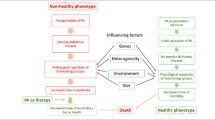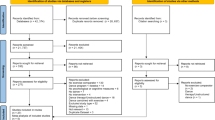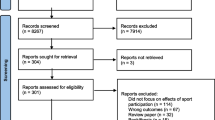Abstract
Purpose
Translating evidence-based exercise interventions into practice is important for expanding the capacity to support cancer survivors. Using the reach, efficacy/effectiveness, adoption, implementation, and maintenance (RE-AIM) framework and scoping study methodology, we addressed the research question, “What is known about the maintenance of exercise interventions for cancer survivors that would inform translation from research to practice and community settings?” Maintenance was investigated at the individual and setting level.
Methods
Literature searches were performed in the PubMed, Cumulative Index to Nursing and Allied Health Literature (CINAHL), and Sport Discus databases for articles published from January 2009 to June 2012. Abstracts were judged using a priori criteria for the survivor population, exercise intervention, and maintenance on the individual or setting level. We included completed and planned randomized controlled trials (RCTs) and other study designs. Publications meeting the criteria were reviewed and coded.
Results
Of the 211 abstracts meeting patient and exercise criteria, 24 (19 RCTs) met the maintenance criteria. Nine of the 12 completed RCTs demonstrated maintenance of intervention outcomes after 3 to 14 months of follow-up. The planned RCTs described interventions lasting 2 to 4.5 months and maintenance intervals lasting 3 to 12 months following the active intervention. Maintenance at the setting level was reported in one publication.
Conclusions
On the individual level, intervention outcomes were maintained in most studies, in a variety of settings and survivor subpopulations. Maintenance on the setting level was scarcely addressed. This scoping study suggests several strategies that could be taken by agencies, clinicians, and researchers to develop more effective and sustainable exercise programs for cancer survivors.
Implications for Cancer Survivors
Many benefits of exercise training are maintained for months after cancer survivors complete controlled research studies but relatively little is known about how to translate research to sustainable community-based exercise programs. A better understanding of how programs can be sustained in practice beyond short-term research or grant funding is needed to support a growing number of survivors.



Similar content being viewed by others
References
PAGA Committee. Physical Activity Guidelines Advisory Committee Report, 2008. In: Services USDoHaH, editor. Washington, D.C.2008.
Schmitz KH, Courneya KS, Matthews C, Demark-Wahnefried W, Galvao DA, Pinto BM, et al. American College of Sports Medicine roundtable on exercise guidelines for cancer survivors. Med Sci Sports Exerc. 2010;42(7):1409–26. Epub 2010/06/19.
White SM, McAuley E, Estabrooks PA, Courneya KS. Translation physical activity interventions for breast cancer survivors into practice: an evaluation of randomized controlled trials. Ann Behav Med. 2009;37:10–9.
Gaglio B, Shoup JA, Glasgow RE. The RE-AIM framework: a systematic review of use over time. Am J Public Health. 2013;103(6):e38–46. Epub 2013/04/20.
Glasgow RE, Vogt TM, Boles SM. Evaluating the public health impact of health promotion interventions: the RE-AIM framework. Am J Public Health. 1999;89(9):1322–7. Epub 1999/09/04.
Rogers LQ, Hopkins-Price P, Vicari S, Pamenter R, Courneya KS, Markwell S, et al. A randomized trial to increase physical activity in breast cancer survivors. Med Sci Sports Exerc. 2009;41(4):935–46. Epub 2009/03/12.
Siegel R, Naishadham D, Jemal A. Cancer statistics, 2012. CA Cancer J Clin. 2012;62(1):10–29.
National Cancer Policy Board. From cancer patient to cancer survivor: lost in transition. Washington, D.C.: 2005 9780309095952.
Glasgow RE, Magid DJ, Beck A, Ritzwoller D, Estabrooks PA. Practical clinical trials for translating research to practice. Design and measurement recommendations. Med Care. 2005;43(6):551–7.
Levac D, Colquhoun, H., O’Brien, K.K. Scoping studies: advancing the methodology. Implementation Science. 2010;5(69).
Arskey H, O’Malley L. Scoping studies: towards a methodological framework. Int J Res Methodol. 2005;8(1):19–32.
Courneya KS, Sellar CM, Stevinson C, McNeely ML, Peddle CJ, Friedenreich CM, et al. Randomized controlled trial of the effects of aerobic exercise on physical functioning and quality of life in lymphoma patients. J Clin Oncol. 2009;27(27):4605–12. Epub 2009/08/19.
Courneya KS, Stevinson C, McNeely ML, Sellar CM, Friedenreich CM, Peddle-McIntyre CJ, et al. Effects of supervised exercise on motivational outcomes and longer-term behavior. Med Sci Sports Exerc. 2012;44(3):542–9. Epub 2011/08/05.
Rabin C, Pinto B, Dunsinger S, Nash J, Trask P. Exercise and relaxation intervention for breast cancer survivors: feasibility, acceptability, and effects. Psychooncology. 2009;18(3):258–66.
Blaauwbroek R, Bouma MJ, Tuinier W, Groenier KH, de Greef MH, Meyboom-de Jong B, et al. The effect of exercise counselling with feedback from a pedometer on fatigue in adult survivors of childhood cancer: a pilot study. Support Care Cancer. 2009;17(8):1041–8. Epub 2008 Nov 18.
Ottenbacher AJ, Day RS, Taylor WC, Sharma SV, Sloane R, Snyder DC, et al. Long-term physical activity outcomes of home-based lifestyle interventions among breast and prostate cancer survivors. Support Care Cancer. 2012;17:17.
Demark-Wahnefried W, Morey MC, Sloane R, Snyder DC, Miller PE, Hartman TJ, et al. Reach out to enhance wellness home-based diet-exercise intervention promotes reproducible and sustainable long-term improvements in health behaviors, body weight, and physical functioning in older overweight/obese cancer survivors. J Clin Oncol. 2012;21:21.
Carson JW, Carson KM, Porter LS, Keefe FJ, Seewaldt VL. Yoga of Awareness program for menopausal symptoms in breast cancer survivors: results from a randomized trial. Support Care Cancer. 2009;17(10):1301–9. Epub 2009 Feb 12.
Bourke L, Doll H, Crank H, Daley A, Rosario D, Saxton JM. Lifestyle intervention in men with advanced prostate cancer receiving androgen suppression therapy: a feasibility study. Cancer Epidemiol Biomarkers Prev. 2011;20(4):647–57.
Wong P, Muanza T, Hijal T, Masse L, Pillay S, Chasen M, et al. Effect of exercise in reducing breast and chest-wall pain in patients with breast cancer: a pilot study. Curr Oncol. 2012;19(3):129–35.
Rogers LQ, Hopkins-Price P, Vicari S, Markwell S, Pamenter R, Courneya KS, et al. Physical activity and health outcomes three months after completing a physical activity behavior change intervention: persistent and delayed effects. Cancer Epidemiol Biomarkers Prev. 2009;18(5):1410–18.
von Gruenigen V, Frasure H, Kavanagh MB, Janata J, Waggoner S, Rose P, et al. Survivors of uterine cancer empowered by exercise and healthy diet (SUCCEED): a randomized controlled trial. Gynecol Oncol. 2012;125(3):699–704.
May AM, Korstjens I, van Weert E, van den Borne B, Hoekstra-Weebers JE, van der Schans CP, et al. Long-term effects on cancer survivors’ quality of life of physical training combined with cognitive-behavioral therapy: results from a randomized trial. Support Care Cancer. 2009;17(6):653–63.
Walsh JM, Hussey, J., Guinan, E., O’Donnell, D. Pragmatic randomized controlled trial of individually prescribed exercise versus usual care in a heterogeneous cancer survivor population: a feasibility study PEACH trial: prescribed exercise after chemotherapy. BMC Cancer. 2010;10(42). Epub 2010 Feb 15
James EL, Stacey, F., Chapman, K., Lubans, D.R., Asprey, G., Sundquist, K., Boyes, A., Girgis, A. Exercise and nutrition routine improving cancer health (ENRICH): the protocol for a randomized efficacy trial of a nutrition and physical activity program for adult cancer survivors and carers. BMC Public Health. 2011;11(236).
Rogers LQ, McAuley E, Anton PM, Courneya KS, Vicari S, Hopkins-Price P, et al. Better exercise adherence after treatment for cancer (BEAT Cancer) study: rationale, design, and methods. Contemp Clin Trials. 2012;33(1):124–37. Epub 2011/10/11.
Chinapaw MJ, Buffart LM, van Mechelen W, Schep G, Aaronson NK, van Harten WH, et al. Alpe d’HuZes cancer rehabilitation (A-CaRe) research: four randomized controlled exercise trials and economic evaluations in cancer patients and survivors. Int J Behav Med. 2012;19(2):143–56.
Velthuis MJ, May, A.M., Koppejan-Rosenbrink, R.A., Gijsen, B.C., van Breda, E., de Wit, G.A., Schroder, C.D., Monninkhof, E.M., Lindeman, E., van der Wall, E., Peeters, P.H. Physical Activity during Cancer Treatment (PACT) Study: design of a randomised clinical trial. BMC Cancer. 2010;10(272). Epub 2010 Jun 9
Livingston PM, Salmon, J., Courneya, K.S., Gaskin, C.J., Craike, M., Botti, M., Broadbent, S., Kent, B. Efficacy of a referral and physical activity program for survivors of prostate cancer [ENGAGE]: rationale and design for a cluster randomised controlled trial. BMC Cancer. 2011;11(237). Epub 2011 Jun 13.
Galvao DA, Taaffe, D.R., Cormie, P., Spry, N., Chambers, S.K., Peddle-McIntyre, C., Baker, M., Denham, J., Joseph, D., Groom, G., Newton, R.U. Efficacy and safety of a modular multi-modal exercise program in prostate cancer patients with bone metastases: a randomized controlled trial. BMC Public Health. 2011;11(517). Epub 2011 Dec 13.
LIttman AJ, Tang, M.T., Rossing, M.A. Longitudinal study of recreational physical activity in breast cancer survivors. J Cancer Surviv. 2010;4(2):119–27. Epub 2010 Feb 24.
Chambers SK, Lynch, B.M., Aitken, J., Baade, P. Relationship over time between psychological distress and physical activity in colorectal cancer survivors. J Clin Oncol. 2009;27(10):1600-6. Epub 2009 Mar 2.
Courneya KS, Friedenreich, C.M., Reid, R.D., Gelmon, K., Mackey, J.R., Ladha, A.B..., Proulx, C., Vallance, J.K., Segal, R.J. Predictors of follow-up exercise behavior 6 months after a randomized trial of exercise training during breast cancer chemotherapy. Breast Cancer Res Treat. 2009;114(4):179–87. Epub 2008 Apr 4.
Midtgaard J, Rossell, K., Christensen, J.F., Uth, J., Adamsen, L., Rorth, M. Demonstration and manifestation of self-determination and illness resistance—a qualitative study of long-term maintenance of physical activity in posttreatment cancer survivors. Support Care Cancer. 2012;20(9):1999–2008. Epub 2011 Nov 15.
Fitzpatrick TR, Remmer, J. Needs, expectations and attendance among participants of a cancer wellness centre in Montreal, Quebec. J Cancer Surviv. 2011;5(3):235–46. Epub 2011 Mar 3.
WHO. WHO International Classification of Functioning, Disability and Health (ICF). World Health Organization; 2001 [updated December 02, 2010; cited 2013 Oct 17]; Available from: http://www.who.int/classifications/icf/en/.
Shubert TE, Altpeter M, Busby-Whitehead J. Using the RE-AIM Framework to translate a research-based falls prevention intervention into a community-based program: lessons learned. J Saf Res. 2011;42:509–16.
Wilson KM, Brady, T.J., Lesesne, C., on behalf of the NCCDPHP Work Group in Translation. An organizing framework for translation in public health: the Knowledge to Action Framework. Prev Chronic Dis. 2011;8(2).
Sander AP, Wilson J, Izzo N, Mountford SA, Hayes KW. Factors that affect decisions about physical activity and exercise in survivors of breast cancer: a qualitative study. Phys Ther. 2012;92(4):525–36.
Pollack LA, Hawkins NA, Peaker BL, Buchanan N, Risendal BC. Dissemination and translation: a frontier for cancer survivorship research. Cancer Epidemiol Biomarkers Prev. 2011;20(10):2093–8.
Cormie P, Galvao DA, Spry N, Joseph D, Taaffe DR, Newton RU. Functional benefits are sustained after a program of supervised resistance exercise in cancer patients with bone metastases: longitudinal results of a pilot study. Support Care Cancer. 2014;22(6):1537–48.
McColl MA, Shortt S, Godwin M, Smith K, Rowe K, O’Brien P, et al. Models for integrating rehabilitation and primary care: a scoping study. Arch Phys Med Rehabil. 2009;90:1523–31.
Kessler RS, Purcell EP, Glasgow RE, Klesges LM, Benkeser RM, Peek CJ. What does it mean to “employ” the RE-AIM model? Eval Health Prof. 2013;36(1):44–66.
Glasgow RE, Marcus AC, Bull SS, Wilson KM. Disseminating effective cancer screening interventions. Cancer. 2004;101(5 Suppl):1239–50.
Acknowledgments
The authors are grateful to Richard Wood and Alice Franco for organizing the publication searches and to Russell E. Glasgow for his critique of the manuscript. Funding for this research was supported by Cooperative Agreement Number 5U48DP001938(03) and 1U48 DP001924 from the Centers for Disease Control and Prevention. The findings and conclusions in this manuscript are those of the author(s) and do not necessarily represent the official position of the Centers for Disease Control and Prevention.
Conflict of interest
Authors Jankowski, Ory, Freidman, Dwyer, Birken, and Risendal have no conflict of interest.
Author information
Authors and Affiliations
Corresponding author
Rights and permissions
About this article
Cite this article
Jankowski, C.M., Ory, M.G., Friedman, D.B. et al. Searching for maintenance in exercise interventions for cancer survivors. J Cancer Surviv 8, 697–706 (2014). https://doi.org/10.1007/s11764-014-0386-y
Received:
Accepted:
Published:
Issue Date:
DOI: https://doi.org/10.1007/s11764-014-0386-y




